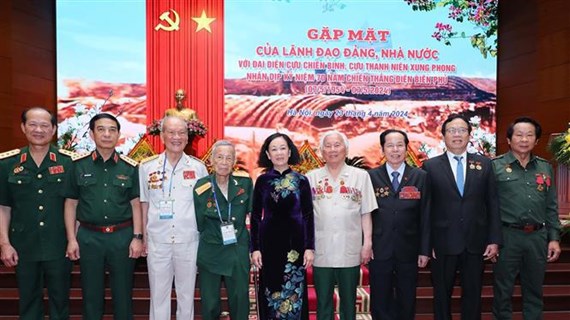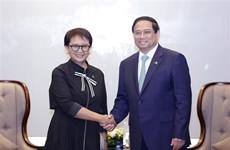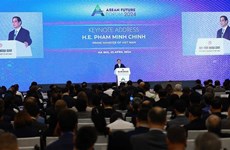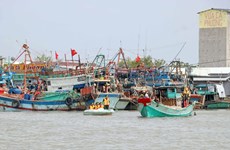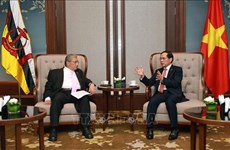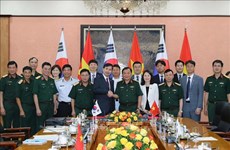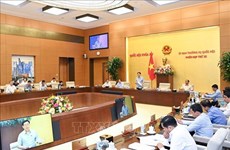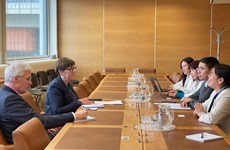Indian President’s visit to tighten bilateral ties
Indian President Pranab Mukherjee will pay a state visit to Vietnam from
September 14-17 to further strengthen the country’s traditional
cooperation and strategic partnership with Vietnam.
Since the two countries established diplomatic ties in 1972 and a strategic partnership in 2007, the Vietnam-India relationship has developed intensively, reflected by the increase in high-level visits.
Since the two countries established diplomatic ties in 1972 and a strategic partnership in 2007, the Vietnam-India relationship has developed intensively, reflected by the increase in high-level visits.
Indian President Pranab Mukherjee will pay a state visit to Vietnam from
September 14-17 to further strengthen the country’s traditional
cooperation and strategic partnership with Vietnam.
Since the two countries established diplomatic ties in 1972 and a strategic partnership in 2007, the Vietnam-India relationship has developed intensively, reflected by the increase in high-level visits.
Since taking office in May 2014, the Government of the Indian People’s Party (BJP), led by Prime Minister Narendra Modi, has strongly promoted India’s “Look East” policy, in which Vietnam is regarded a “pillar”.
Indian Foreign Minister Sushma Swaraj’s visit to Vietnam on August 25-26 added a new driving force to the partnership between the two nations.
Vietnam-India relations have been developing successfully, built on the five pillars of politics, economy, security-defence, science-technology, and culture-education.
Economic cooperation is a shining example of the booming relationship, with bilateral trade estimated to reach 8 billion USD this year, compared to 3.4 billion USD in 2010. The two sides are striving to increase trade value to 10 billion USD by 2015 and 15 billion USD by 2020.
As many as 68 Indian-invested projects worth approximately 1 billion USD have been put into operation in Vietnam so far, mainly focusing on oil and gas exploration, mineral exploitation and processing, sugar production, agricultural chemicals, information technology (IT) and food processing.
Meanwhile, Vietnamese companies have invested in a total of three projects in India worth 23.6 million USD.
IT is now an important focal point in the knowledge-based partnership between the two countries. India helped Vietnam set up IT and English training centres as well as business development institutes.
Thanks to India’s support, Vietnam’s rice research institute was established, paving the way for Vietnam to become the world’s leading rice exporter.
India granted hundreds of scholarships to Vietnamese students each year under the Indian Technological and Economic Cooperation (ITEC) Programme.
Defence collaboration between the two countries has developed strongly in recent years, with the establishment of a deputy defence minister-level strategic dialogue and the acceleration of joint naval exercises.
The two sides have closely cooperated with each other at regional and international forums, including the Association of Southeast Asian Nations (ASEAN), the East Asia Summit (EAS), the Mekong-Ganga Cooperation (MGC) and the Asia-Europe Meeting (ASEM).-VNA
Since the two countries established diplomatic ties in 1972 and a strategic partnership in 2007, the Vietnam-India relationship has developed intensively, reflected by the increase in high-level visits.
Since taking office in May 2014, the Government of the Indian People’s Party (BJP), led by Prime Minister Narendra Modi, has strongly promoted India’s “Look East” policy, in which Vietnam is regarded a “pillar”.
Indian Foreign Minister Sushma Swaraj’s visit to Vietnam on August 25-26 added a new driving force to the partnership between the two nations.
Vietnam-India relations have been developing successfully, built on the five pillars of politics, economy, security-defence, science-technology, and culture-education.
Economic cooperation is a shining example of the booming relationship, with bilateral trade estimated to reach 8 billion USD this year, compared to 3.4 billion USD in 2010. The two sides are striving to increase trade value to 10 billion USD by 2015 and 15 billion USD by 2020.
As many as 68 Indian-invested projects worth approximately 1 billion USD have been put into operation in Vietnam so far, mainly focusing on oil and gas exploration, mineral exploitation and processing, sugar production, agricultural chemicals, information technology (IT) and food processing.
Meanwhile, Vietnamese companies have invested in a total of three projects in India worth 23.6 million USD.
IT is now an important focal point in the knowledge-based partnership between the two countries. India helped Vietnam set up IT and English training centres as well as business development institutes.
Thanks to India’s support, Vietnam’s rice research institute was established, paving the way for Vietnam to become the world’s leading rice exporter.
India granted hundreds of scholarships to Vietnamese students each year under the Indian Technological and Economic Cooperation (ITEC) Programme.
Defence collaboration between the two countries has developed strongly in recent years, with the establishment of a deputy defence minister-level strategic dialogue and the acceleration of joint naval exercises.
The two sides have closely cooperated with each other at regional and international forums, including the Association of Southeast Asian Nations (ASEAN), the East Asia Summit (EAS), the Mekong-Ganga Cooperation (MGC) and the Asia-Europe Meeting (ASEM).-VNA





